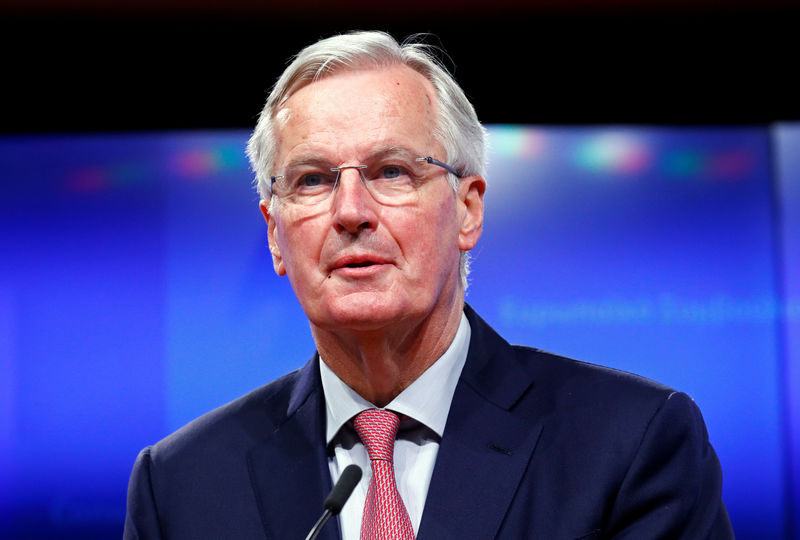By Gabriela Baczynska and Alastair Macdonald
BRUSSELS (Reuters) - The European Union's Brexit negotiator Michel Barnier said on Monday the draft Brexit deal reached with London was "fair and balanced", as the bloc haggled with Britain over any extension to the envisaged transition period.
Barnier told a news conference after briefing the 27 national EU ministers that they generally approved of the draft divorce agreement reached last week, and that a blank in the document on the end date for a possible extension of the status-quo transition period should be resolved for a summit on Sunday.
"The deal is fair and balanced," Barnier said. "We are in fact at a decisive moment in this process; no one should lose sight of the progress that has been achieved in Brussels and in London," Barnier said.
"In particular, member states support the draft withdrawal agreement. The EU side will still have to decide the internal process for agreeing to extend the transition period."
British Prime Minister Theresa May said on Monday she wanted the transition phase to have ended by the time the UK is due to hold a national election in 2022.
The transition period would keep post-Brexit Britain subject to EU rules - but without a vote - for long enough to allow details of their future relationship to be negotiated.
Barnier said any extension would only be a one-off and must be clearly limited in time. The view was echoed by the French minister attending the meeting, who said it was important to offer certainty to all those affected by Britain's withdrawal.
Barnier said the UK would have to make appropriate contributions to EU coffers if it were to stay in the bloc's customs union and single market beyond the currently envisaged end of the transition at end-2020, 21 months after Brexit.
The UK has been saying any extension would only be "a matter of months" but has also sought to keep it open for now. Barnier insisted that a latest cut-off would be agreed this week.
"FAIR DEAL"
The other outstanding issues concern fishing and Gibraltar. Barnier told EU envoys on Sunday that the EU could propose extending the transition out to no later than Dec. 31, 2022.
"We see it as a safety net if things take more time with negotiating the future relationship. But internally in the UK it's a very hard sell and the problem is on their side to lock it in," one EU diplomat said.
Adding that date in the treaty, even as a hypothetical last resort, is all but certain to anger the Brexit supporters whose votes May needs to pass the deal in Britain's parliament.
Barnier said the intention remained to negotiate a future accord during the transition period that would provide the "free trade area" May had asked for as well as arrangements that would avoid a "hard border" between Ireland and Northern Ireland, on Britain's only future land frontier with the EU.
May was battling at home to save the draft agreement reached between the EU and London last week after it came under heavy criticism from supporters of a clean cut from the EU, the Northern Ireland's unionists and those seeking to preserve close ties with the bloc after Brexit day on March 29, 2019.
Germany and the other EU ministers on Monday told Britain the draft Brexit agreement could not be renegotiated. Speaking at the news conference with Barnier, Austria's Gernot Blumel said it was "a fair compromise."

"Breakups are never easy but it's always better when it happens on friendly terms. That is also the best way to build a good relationship in the future," Blumel said.